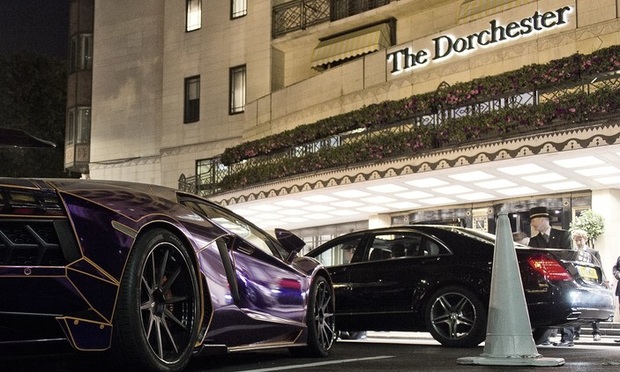Firms urged to do more to end male domination of corporate networking as female partners call out 'sleazy' events
97% of female partners say work events are still too focused on traditionally male interests
January 30, 2018 at 11:05 AM
7 minute read
The vast majority of partners believe law firms need to do more to make corporate networking activities more inclusive for both men and women, with 97% of female respondents to a Legal Week survey saying work events are still too focused on traditionally male interests.
As the scandal surrounding the infamous Presidents Club charity dinner continues to simmer, the results of the latest Big Question survey highlight widespread concerns among partners about the overt male focus of many corporate events – a dominance that many believe is still acting as a barrier to female career progression.
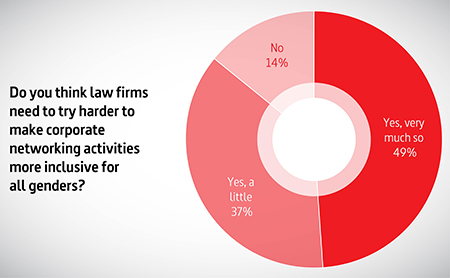 Eighty-six percent of respondents to the survey – which garnered responses from more than 250 partners – say law firms need to make corporate networking activities more inclusive, including almost 50% who think firms must try "much" harder.
Eighty-six percent of respondents to the survey – which garnered responses from more than 250 partners – say law firms need to make corporate networking activities more inclusive, including almost 50% who think firms must try "much" harder.
However, the survey found a significant difference in opinion between men and women on what law firms should be doing to rectify this, with almost all female respondents (97%) of the belief that law firms should be trying harder to make such events more inclusive, while in stark contrast, more than 50% of male respondents said the legal profession does not have a problem with corporate events being too focused on men.
With regards to whether men-only events are still acceptable in this day and age, opinion was broadly similar among men and women, with 58% of all respondents saying they disapproved of such events. Only 13% of respondents had attended a men-only event, and of those, only 20% had attended one in the past year
However, some female partners argue that their key objection to events like the Presidents Club dinner is not the male-only element, but the sleaziness. The survey shows that some lawyers continue to go to male-oriented events, with a quarter of all respondents saying they have been to an event at which hostesses were employed, and one in 10 admitting they have been to a strip club on a work outing.
 Linklaters corporate partner Sarah Wiggins (pictured) says: "I'm surprised 10% say they have been to strip clubs. If I found out that people I knew had been to them, I would call it out. I don't think that's appropriate – women- and men-only events are fine, but things that are sleazy or bring men into disrepute are not."
Linklaters corporate partner Sarah Wiggins (pictured) says: "I'm surprised 10% say they have been to strip clubs. If I found out that people I knew had been to them, I would call it out. I don't think that's appropriate – women- and men-only events are fine, but things that are sleazy or bring men into disrepute are not."
Wiggins adds taking along children, partners or spouses creates "a totally different vibe" and "stops events getting sleazy".
 Simmons & Simmons disputes partner Caroline Hunter-Yeats (pictured) says: "The bit we all object to is the sleazy element – it's not the gender. It has got to be right that people of a similar gender can have a work evening out that is not demeaning to others. I am genuinely surprised by the number being taken to strip clubs."
Simmons & Simmons disputes partner Caroline Hunter-Yeats (pictured) says: "The bit we all object to is the sleazy element – it's not the gender. It has got to be right that people of a similar gender can have a work evening out that is not demeaning to others. I am genuinely surprised by the number being taken to strip clubs."
About a quarter of respondents also said their law firm does not have a clear policy on acceptable behaviour at networking events. Moreover, if a lawyer's attendance at an event is deemed to be inappropriate, 71% of respondents said they should be warned, while just 5% said they should be fired.
Fieldfisher partner Jill Greenfield says: "I do think sometimes you go to dinners where there are auctions with young women carrying around heavy pictures. It doesn't look right and makes people feel uncomfortable. Going forward, I can see how people will think about that and think more about the demographic – more of that needs to happen."
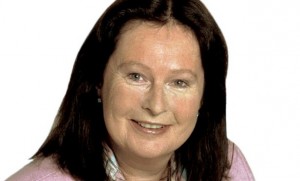 More than 80% of respondents said that non-inclusive networking activities make it more difficult for women to progress in law – a belief held by 93% of female respondents and 75% of men.
More than 80% of respondents said that non-inclusive networking activities make it more difficult for women to progress in law – a belief held by 93% of female respondents and 75% of men.
CMS senior partner Penelope Warne (pictured) commented: "More still needs to be done to improve 'City' culture. Although significant steps forward have been made, women often find career opportunities are harder to attain. Business social events can also sometimes leave women feeling awkward or uncomfortable. Law firms have an important role to create a diverse and inclusive culture and to ensure values of respect and trust are recognised throughout their organisations – this requires responsible leadership where it is known that there is zero tolerance for inappropriate behaviour."
 Speaking about their own experiences, some female partners say they have felt directly excluded from events. Greenfield (pictured) says: "When I was a trainee at another law firm, the firm was organising a golf club event and women were not allowed in a bar. I went to see the managing partner and told him how inappropriate I thought that was, and it was changed. I thought: 'I don't feel happy with this, I haven't gone into the law to come up against these silly barriers.'"
Speaking about their own experiences, some female partners say they have felt directly excluded from events. Greenfield (pictured) says: "When I was a trainee at another law firm, the firm was organising a golf club event and women were not allowed in a bar. I went to see the managing partner and told him how inappropriate I thought that was, and it was changed. I thought: 'I don't feel happy with this, I haven't gone into the law to come up against these silly barriers.'"
Wiggins comments: "There's only been one time in my career where I've felt excluded, which was when I was out with a legal headhunter who wanted to do work with Linklaters. We were with another male partner and this headhunter kept talking about rugby. I thought it was a waste of my time, given that he made no effort to include me."
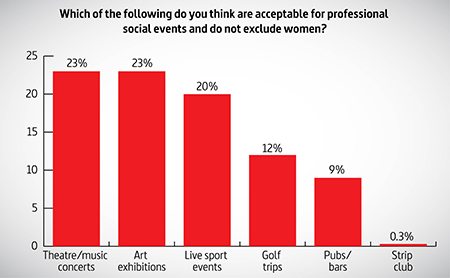 Among the types of professional social events cited as the least exclusive to men, most partners picked theatre visits and music concerts, with art exhibitions and live sport events also identified as acceptable for both genders.
Among the types of professional social events cited as the least exclusive to men, most partners picked theatre visits and music concerts, with art exhibitions and live sport events also identified as acceptable for both genders.
Wiggins comments: "Events around music, art galleries and theatre are great. You're usually using networking events to establish relationships with people, so theatre with dinner beforehand and art exhibitions are opportunities to do things with people that are like-minded."
Travers Smith pensions head and diversity and inclusion board member Daniel Gerring says Travers has worked hard to make its events "as inclusive as possible", which has included publishing a best practice guide for partners on how to organise corporate events.
Gerring also points to activities such as art and music as particularly inclusive, giving the example of a female associate who had "struggled to find the right event to invite a very senior male client to".
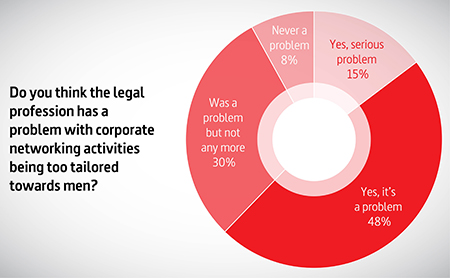 "It didn't appeal to her to take him to a sporting event or to take him out for dinner. She was trying to find a corporate hospitality experience which they would both enjoy and which could help build their relationship. She invited him to our corporate social responsibility art event, which turned out a starting point to building a very strong relationship," Gerring says.
"It didn't appeal to her to take him to a sporting event or to take him out for dinner. She was trying to find a corporate hospitality experience which they would both enjoy and which could help build their relationship. She invited him to our corporate social responsibility art event, which turned out a starting point to building a very strong relationship," Gerring says.
Greenfield concludes that law firms need to "very wary" when planning events for the year. "It is a natural thing for men to say to other men: 'let's go to the bar, let's meet this client'. The real problem is law firms may not be talking to women about what could be a good idea for marketing and decisions are made at a senior level where there are fewer women."
This content has been archived. It is available through our partners, LexisNexis® and Bloomberg Law.
To view this content, please continue to their sites.
Not a Lexis Subscriber?
Subscribe Now
Not a Bloomberg Law Subscriber?
Subscribe Now
NOT FOR REPRINT
© 2025 ALM Global, LLC, All Rights Reserved. Request academic re-use from www.copyright.com. All other uses, submit a request to [email protected]. For more information visit Asset & Logo Licensing.
You Might Like
View All
KPMG's Bid To Practice Law in US On Hold As Arizona Court Exercises Caution

Combative Arguments at EU's Highest Court Over Google's €4.13B Antitrust Fine Emphasize High Stakes and Invoke Trump
4 minute read
Law Firms 'Struggling' With Partner Pay Segmentation, as Top Rainmakers Bring In More Revenue
5 minute readTrending Stories
- 1Uber Files RICO Suit Against Plaintiff-Side Firms Alleging Fraudulent Injury Claims
- 2The Law Firm Disrupted: Scrutinizing the Elephant More Than the Mouse
- 3Inherent Diminished Value Damages Unavailable to 3rd-Party Claimants, Court Says
- 4Pa. Defense Firm Sued by Client Over Ex-Eagles Player's $43.5M Med Mal Win
- 5Losses Mount at Morris Manning, but Departing Ex-Chair Stays Bullish About His Old Firm's Future
Who Got The Work
J. Brugh Lower of Gibbons has entered an appearance for industrial equipment supplier Devco Corporation in a pending trademark infringement lawsuit. The suit, accusing the defendant of selling knock-off Graco products, was filed Dec. 18 in New Jersey District Court by Rivkin Radler on behalf of Graco Inc. and Graco Minnesota. The case, assigned to U.S. District Judge Zahid N. Quraishi, is 3:24-cv-11294, Graco Inc. et al v. Devco Corporation.
Who Got The Work
Rebecca Maller-Stein and Kent A. Yalowitz of Arnold & Porter Kaye Scholer have entered their appearances for Hanaco Venture Capital and its executives, Lior Prosor and David Frankel, in a pending securities lawsuit. The action, filed on Dec. 24 in New York Southern District Court by Zell, Aron & Co. on behalf of Goldeneye Advisors, accuses the defendants of negligently and fraudulently managing the plaintiff's $1 million investment. The case, assigned to U.S. District Judge Vernon S. Broderick, is 1:24-cv-09918, Goldeneye Advisors, LLC v. Hanaco Venture Capital, Ltd. et al.
Who Got The Work
Attorneys from A&O Shearman has stepped in as defense counsel for Toronto-Dominion Bank and other defendants in a pending securities class action. The suit, filed Dec. 11 in New York Southern District Court by Bleichmar Fonti & Auld, accuses the defendants of concealing the bank's 'pervasive' deficiencies in regards to its compliance with the Bank Secrecy Act and the quality of its anti-money laundering controls. The case, assigned to U.S. District Judge Arun Subramanian, is 1:24-cv-09445, Gonzalez v. The Toronto-Dominion Bank et al.
Who Got The Work
Crown Castle International, a Pennsylvania company providing shared communications infrastructure, has turned to Luke D. Wolf of Gordon Rees Scully Mansukhani to fend off a pending breach-of-contract lawsuit. The court action, filed Nov. 25 in Michigan Eastern District Court by Hooper Hathaway PC on behalf of The Town Residences LLC, accuses Crown Castle of failing to transfer approximately $30,000 in utility payments from T-Mobile in breach of a roof-top lease and assignment agreement. The case, assigned to U.S. District Judge Susan K. Declercq, is 2:24-cv-13131, The Town Residences LLC v. T-Mobile US, Inc. et al.
Who Got The Work
Wilfred P. Coronato and Daniel M. Schwartz of McCarter & English have stepped in as defense counsel to Electrolux Home Products Inc. in a pending product liability lawsuit. The court action, filed Nov. 26 in New York Eastern District Court by Poulos Lopiccolo PC and Nagel Rice LLP on behalf of David Stern, alleges that the defendant's refrigerators’ drawers and shelving repeatedly break and fall apart within months after purchase. The case, assigned to U.S. District Judge Joan M. Azrack, is 2:24-cv-08204, Stern v. Electrolux Home Products, Inc.
Featured Firms
Law Offices of Gary Martin Hays & Associates, P.C.
(470) 294-1674
Law Offices of Mark E. Salomone
(857) 444-6468
Smith & Hassler
(713) 739-1250





